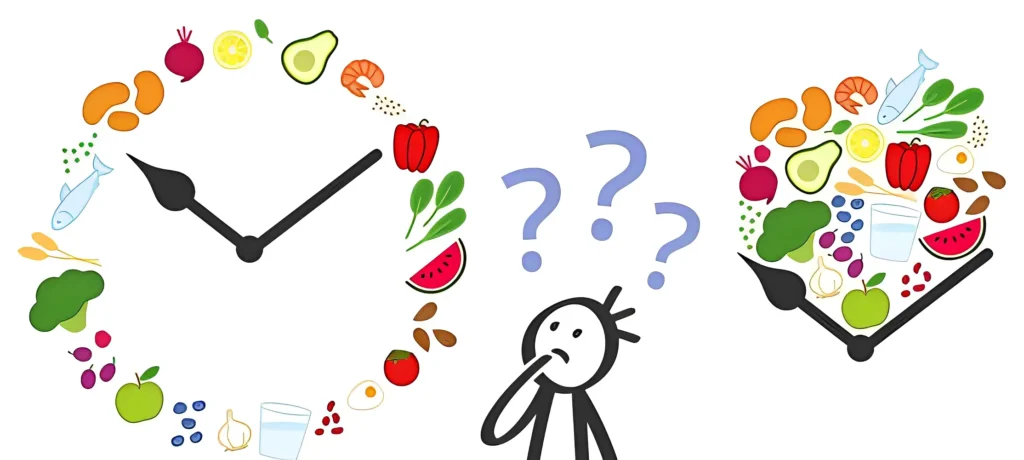Stuck in a weight and energy rut? You’re not alone. Millions are exploring Intermittent Fasting benefits, wondering if it’s the key to unlocking a healthier, happier life. Discover if this approach could be right for you!
But let’s be honest, the internet is overflowing with conflicting information, leaving you more confused than before. Fear not, friend! I’ve been down that rabbit hole too, and let me tell you, intermittent fasting isn’t one-size-fits-all.
So, before we dive into the world of restricted eating windows and potential health improvements, tell me: what are YOU hoping to achieve? Is it shredding stubborn pounds, boosting your energy, or even taming those pesky blood sugar swings? Sharing your goals helps tailor this journey to YOUR needs and pave the way for a personalized path to success.
Ready to explore the intriguing world of intermittent fasting benefits together? Let’s go!
P.S. Stay tuned for science-backed insights, practical tips, and real-life experiences to help you decide if intermittent fasting could be the missing piece to your wellness puzzle.
1. Evidence-Based Intermittent Fasting Benefits (Storytelling & Nuances):

Ever struggle with stubborn belly fat, even if you exercise and eat “healthy”? You’re not alone. Millions grapple with weight loss plateaus, feeling frustrated and discouraged. But what if there’s a simple dietary approach that could help unlock your fat-burning potential? Enter intermittent fasting (IF), a pattern of cycling between eating and fasting periods.
Now, you might be asking, “Can intermittent fasting benefits really help me lose weight and improve my health?” The answer, based on growing research, is a resounding “Yes!” Let’s delve into the science behind these benefits, busting some myths along the way.
1. Bye-bye, belly fat! Studies show that IF can be more effective than calorie restriction alone for weight loss, particularly around the midsection. Think improved insulin sensitivity and increased fat burning, thanks to metabolic shifts triggered by fasting periods.
2. Tame the sugar monster! Struggling with sugar cravings and blood sugar spikes? IF might be your new best friend. Research suggests it can improve insulin sensitivity and HbA1c levels, potentially helping manage type 2 diabetes and prediabetes.
3. Heart health hero! Worried about your heart health? IF shows promise in lowering bad cholesterol, reducing blood pressure, and decreasing inflammation, all key players in cardiovascular health.
4. Brainpower boost! Feeling foggy-headed lately? IF might sharpen your cognitive edge. Studies indicate it can enhance memory, focus, and decision-making abilities, potentially protecting against neurodegenerative diseases.
Remember, individual results may vary. But the science is clear: intermittent fasting benefits extend far beyond weight loss, potentially impacting your overall health and well-being.
Ready to explore the world of IF? Stay tuned for practical tips and different approaches to find the perfect fit for you!
Sources:
- National Institutes of Health: https://www.nih.gov
2. Considerations & Individualization (Tailored & Actionable):

Ready to dive into the world of IF and unlock its potential benefits? Hold on, there’s one crucial step before you jump in: Personalization!
Why is this so important? Because like snowflakes, no two people are exactly alike. What works wonders for your workout buddy might leave you feeling drained and grumpy. But worry not, friend! Here’s how to tailor IF to your unique needs and goals:
1. What’s your health status? Got any pre-existing conditions, like diabetes or heart issues? Consulting a healthcare professional before starting IF is key. They can help you navigate any potential risks and ensure you choose a safe approach. 🩺
2. What’s your lifestyle like? Are you a busy bee with a hectic schedule? Opt for a flexible method like the 5:2 diet (fasting for two non-consecutive days). Prefer structure? The 16:8 method (fasting for 16 hours) might be your sweet spot. ️
3. What are your goals? Want to shed some pounds? Focus on calorie restriction during your eating window. Seeking improved insulin sensitivity? Experiment with longer fasting periods. Remember, clear goals = clear focus = better results!
4. Listen to your body! Feeling dizzy or experiencing headaches? Don’t push through. Adjust your fasting window or break the fast if needed. Your body’s signals are your best guide.
5. Don’t go it alone! Share your journey with friends, family, or online communities. Surrounding yourself with supportive people can boost your motivation and keep you accountable.
Bonus tip: Start slow! Instead of jumping straight into long fasts, gradually increase the duration over time. Your body (and taste buds!) will thank you for it.
Remember, the “benefits” of intermittent fasting are personal. By tailoring your approach and prioritizing your well-being, you’ll unlock the true potential of this lifestyle choice.
P.S. Still unsure where to start? Check out these credible resources for personalized IF guidance:
- National Institutes of Health (NIH): https://www.niddk.nih.gov/health-information/weight-management/adult-overweight-obesity
3. Potential Drawbacks & Cautions (Transparency & Solutions):

So, you’re intrigued by the potential intermittent fasting benefits and ready to dive in? Awesome! But before you embark on this exciting journey, let’s talk about some potential roadblocks you might encounter, because transparency is key to success—and safety.
Hold on, is intermittent fasting right for everyone? Absolutely not. While generally safe for healthy adults, certain groups shouldn’t fast without medical supervision. This includes pregnant or breastfeeding women, individuals with eating disorders, those with uncontrolled chronic conditions, and anyone taking certain medications. If you fall into any of these categories, consult your doctor before even considering an intermittent fasting plan.
Okay, I’m good to go! But won’t I be starving the whole time? Well, hunger pangs are a common initial hurdle. However, research suggests these usually subside after a few days as your body adjusts. Pro tip: stay hydrated, find healthy distractions, and focus on the intermittent fasting benefits waiting on the other side!
What about side effects? I’ve heard some nasty rumors. It’s true, temporary side effects like fatigue, headaches, and even irritability are possible. But don’t fret! These usually fade quickly as your body adapts. Remember, intermittent fasting isn’t about pushing limits; listen to your body and break the fast if you feel unwell.
But let’s say I stick it out and experience long-term issues? While unlikely, if you find yourself struggling with persistent side effects, excessive weight loss, or any concerning changes in mood or energy levels, stop the fast immediately and consult your doctor. Remember, your health is the top priority, and intermittent fasting benefits shouldn’t come at a cost.
So, what’s the takeaway? Intermittent fasting can be a powerful tool for optimizing your health, but it’s not a magic bullet, and transparency is key. Be honest with yourself and your doctor about your health, listen to your body, and prioritize safety above all else. With the right approach, you can reap the rewards of intermittent fasting while staying healthy and happy.
Sources:
- National Institutes of Health: https://www.nia.nih.gov/news/research-intermittent-fasting-shows-health-benefits
- Academy of Nutrition and Dietetics: https://www.eatright.org/health/wellness/diet-trends/what-is-intermittent-fasting
- Harvard Health Publishing: https://www.health.harvard.edu/blog/should-you-try-intermittent-fasting-for-weight-loss-202207282790
Remember, consult your healthcare professional before starting any new diet or fasting program.
Conclusion :
So, you’ve dipped your toes into the world of intermittent fasting (IF) and explored its potential benefits. But is it right for you? That’s a question only you can answer. The beauty of IF lies in its flexibility: there’s no one-size-fits-all approach.

Feeling empowered? Take the reins and experiment! Remember, sustainable habits trump quick fixes. Start small, listen to your body, and adapt the method to your lifestyle.
Still on the fence? Don’t worry, curiosity is key! Dive deeper into the research: explore published studies by esteemed institutions like the National Institutes of Health (NIH) or renowned medical journals. Chat with a registered dietitian or your healthcare provider – their insights can make all the difference.
Remember, the journey towards a healthier you is personal. Embrace the exploration, prioritize well-being, and let the intermittent fasting benefits unfold, one step at a time.
Is your interest piqued? Share your thoughts and questions in the comments below! Let’s build a supportive community around the IF experience.
You can read: Foods that Lower Blood Sugar: Your Guide to Balanced Eating